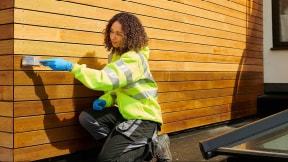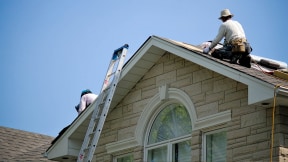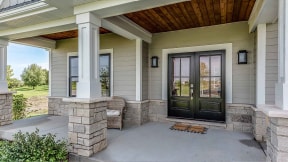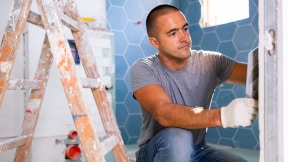What are home improvement grants for homeowners and how to find one?
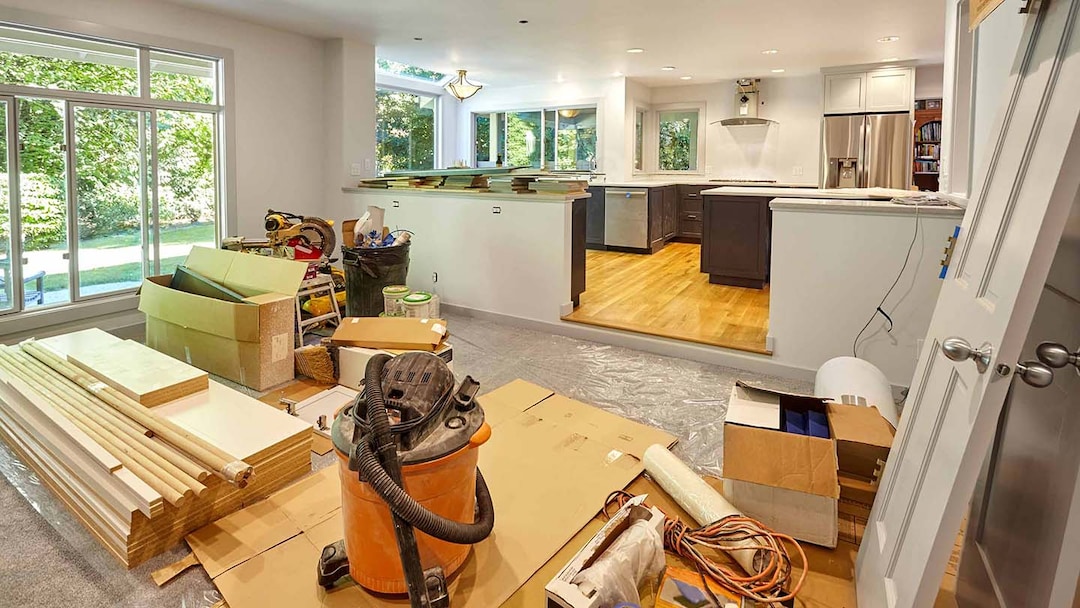
This article is for educational purposes only. JPMorgan Chase Bank, N.A., currently offers home equity lines of credit (HELOCs) in select states and does not offer home equity loans in any state. Please talk with a Home Lending Advisor to see if HELOCs are available in your area. Any information described in this article may vary by lender.
You’re looking for a home and you see a lot of houses with potential, but you're worried about the cost of replacing the roof. Or maybe you’re already a homeowner and the list of things you want to improve in your house is growing by the minute. Whatever your situation, home improvement projects can get expensive and this is where home improvement grants come in. These are government grants intended to provide homeowners with financial aid for various types of home improvement. Let’s learn more about how to find home improvement grants for homeowners. Note that JPMorgan Chase Bank may not offer all of the products below.
What are home improvement grants?
In simplest terms, a grant is money that you receive and don’t need to pay back. These may come from your local, state or federal government, or a non-government agency, such as a non-profit. Grants typically have an application process where the agency awarding the grant will use specific criteria to determine who receives funds.
Home improvement grants are typically grants for home repair, meaning you must use one to repair something in your home that may be a health or safety hazard. They may also be used to improve your home’s handicap accessibility. Since home improvement grants for homeowners tend to be government-backed, you generally can’t use the funds for cosmetic improvements. For instance, if you don’t like your kitchen cabinets, you can’t apply for a home improvement grant to replace them.
Government grants generally have strict rules and are quite competitive. Depending on your situation, you may qualify for some grants and not others. To give yourself the best chance at successfully applying for a grant, you may want to familiarize yourself with the types of home improvement grants available so you’re ready to apply when the opportunity presents itself.
Government grants for home improvement
Government grants for home improvements are funded by taxpayer dollars and exist to help homeowners who are dealing with essential or critical home improvement needs. There are quite a few available grants to fix up old homes (or newer ones) so that they can function safely. These include:
HOME Investment Partnerships Program
This grant is through the United States Department of Housing and Urban Development (HUD) and trickles through local or state government to low-income households. HOME funds can be distributed in various ways, including as a grant, direct loan or loan guarantee. To qualify, you need to meet income limits set by HUD, which vary by state.
Section 504 Home Repair Program
This grant is through the United States Department of Agriculture in support of rural development. It provides loans to homeowners who qualify based on income limit criteria per program limits for repairs, modernizations and improvements. It also provides grants to eligible homeowners aged 62 or over to remove health and safety hazards.
To qualify for any funding, you must be the homeowner and occupy the house, be unable to obtain affordable credit elsewhere and have a family income that meets the program limit (varies by state). Note that anyone under the age of 62 will receive funds in the form of a loan that are repaid over 20 years at a fixed interest rate of 1%. Again, grants are only available to homeowners 62 years old or older and must only be repaid if the property is sold in less than three years.
Area Agency on Aging
Area Agency on Aging is a program that tends to be quite localized. Funding for the agency is administered through the state and is designated to help seniors improve their properties. Exact eligibility requirements and grant availability will vary depending on where you live. For more specific information, contact your county’s Office for the Aging.
Native American Housing Improvement Program
The United State Department of the Interior has a Housing Improvement Program administered by the Bureau of Indian Affairs (BIA). The grant programec-usagov-hm-repair was designed to help American Indians and Alaska Native homeowners with home repair, renovation or replacement, or with new housing. To be eligible for the Housing Improvement Program you must meet the following criteria:
- Be a member of a federally recognized American Indian tribe or be an Alaska Native.
- Have an income not more than 150% of the United States Department of Health and Human Services poverty guideline.
- Live in an area designated by a tribe and approved by the BIA.
- Currently live in housing that regulations define as substandard.ec_housing-improvement-program-fn
- Did not acquire your current housing through a federally sponsored housing program.
For more information, contact your local tribal or BIA housing office.
Energy efficiency grants
There are various programs available for homeowners who want to improve their home's efficiency. The United States Department of Energy has a Weatherization Assistance Program that is administered at both the state and local level.
The program aims to reduce energy costs for low-income households by increasing energy efficiency through measures like sealing cracks and holes to reduce heat loss, adding insulation, repairing or replacing heating systems, repair or replacement for windows and outside doors and providing efficient lighting and refrigeration. Funds from this program come in the form of a grant. Exact eligibility requirements vary by state.
In addition to the federal program above, there are also many state programs, so be sure to contact your state’s energy department.
Grants for veterans
The United States Department of Veterans Affairs offers a few programs for service members who have certain service-related disabilities. Qualifying disabilities may includeec_disability-housing-grants-for-veterans-fn:
- Loss, or loss of use, of more than one limb.
- Loss, or loss of use, of a lower leg, as well as the lasting effects of a disease or injury.
- Blindness in both eyes, measured by 20/200 visual acuity or less.
- Some severe burns.
- The loss, or loss of use, of a foot or leg after Sept. 11, 2001, which requires you to use braces, crutches, canes or a wheelchair.
- The loss, or loss of use, of both hands.
- Some respiratory or breathing injuries.
The grants available through the VA include:
- Specially Adapted Housing: Grant money must be used to buy, build or change your permanent home. You must own (or will own) the home and have a qualifying disability.
- Special Home Adaptation: Grant money must be used to buy, build or change your permanent home. You or a family member must own (or will own) the home and you have a qualifying disability.
- Temporary Residence Adaptation: You must qualify for an SAH or SHA grant and you must be temporarily living in a family member’s home that requires changes to meet your needs.
Where to find home improvement grants for homeowners
If you’re hoping to find a grant for home repairs that fits your situation, there are a few things you can do:
- Contact your local government to ask about any local programs.
- For federal grants for home repair, consult government websites like the HUD and VA sites.
- Ask your utility company if they know of any grants.
- Talk to a housing counselor for specific recommendations.
Alternatives to home improvement grants
If you aren’t eligible for home improvement grants or you’re looking for ways to refinance for a home renovation, you may want to consider the following:
- Cash-out refinanceec-refinance-hl000061: A cash-out refinance is an option that allows you to convert home equity into cash. You replace your existing mortgage with one that’s more than you owe on your current mortgage. The balance is then paid to you to use however you want.
- FHA 203(k) home improvement loan: If your renovations include necessary repairs, you may qualify for an FHA 203(k) loan from the Federal Housing Administration. These funds can’t be used for luxury upgrades, such as a swimming pool. Note that JPMorgan Chase Bank does not offer FHA 203(k) loans at this time.
- Home equity loan: A home equity loan lets homeowners borrow against the equity of their home. You’ll likely need adequate home equity, a stable income, good credit history and a low debt-to-income ratio to qualify.
In summary
There are quite a few home improvement grants for homeowners available. However, it’s important that you do your research to make sure you’re only applying for grants that you’re eligible for. Because these grants are government-backed, and thus funded by taxpayers, the eligibility requirements tend to be strict and there’s generally quite a bit of competition. Keep an eye on available grants and soon you may just find you’ve got the money you need to make those home improvements. This article is for educational purposes only.
Home improvement grants FAQs
1. Are there grants for home repairs for seniors?
Yes, there are home repair grants specifically designed for seniors, such as the Section 504 Home Repair Programec-usda-rd-grants. Additionally, you can reach out to your local Office for the Aging for other grant opportunities.
2. Are there home improvement grants for foundation repair?
Yes and no. There isn’t a specific foundation repair grant, but foundation repairs are considered essential and are therefore likely eligible for many government-backed home improvement grants. You will, however, still need to meet the other eligibility requirements as well.
3. Are there home improvement grants for disabled homeowners?
Yes, improvements required for disabled homeowners are eligible under the Section 504 Home Repair Program and the VA programs, if your disability is service-related. There are also many private organizations that offer grants specifically for disabled homeowners to improve their homes.
4. Who is eligible for government home improvement grants?
Eligibility for government home improvement grants varies depending on the grant. However, there are often income limits to ensure the grants are going to homeowners who need them most.
5. How to get a home improvement grant?
To get a home improvement grant you must meet eligibility requirements, submit an application and be chosen for the grant. The first step is to research different grants to find the one that makes the most sense for your personal circumstances.
